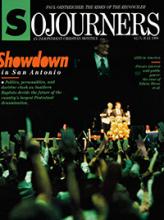Who is on the Lord's side? Who will serve the King?
Who will be His helpers, other lives to bring?
Who will leave the world's side? Who will face the foe?
Who is on the Lord's side? Who for Him will go?
By Thy call of mercy, by Thy grace divine,
we are on the Lord's side, Saviour, we are Thine.
Fierce may be the conflict, strong may be the foe,
but the King's own army none can overthrow.
Round his standard ranging victory is secure;
for His truth unchanging makes the triumph sure.
Joyfully enlisting by Thy grace divine,
we are on the Lord's side, Saviour, we are Thine.
--"Who Is On the Lord's Side?" (19th-century traditional hymn)
Read the Full Article

Already a subscriber? Login
